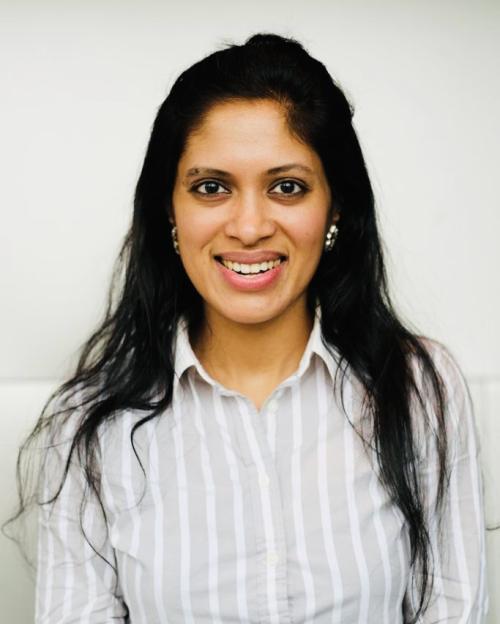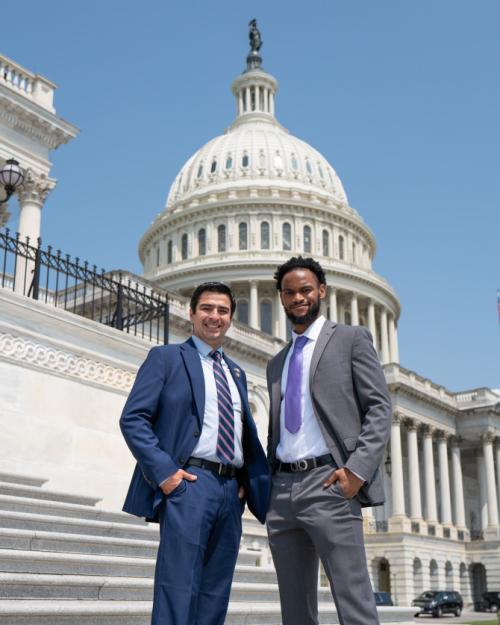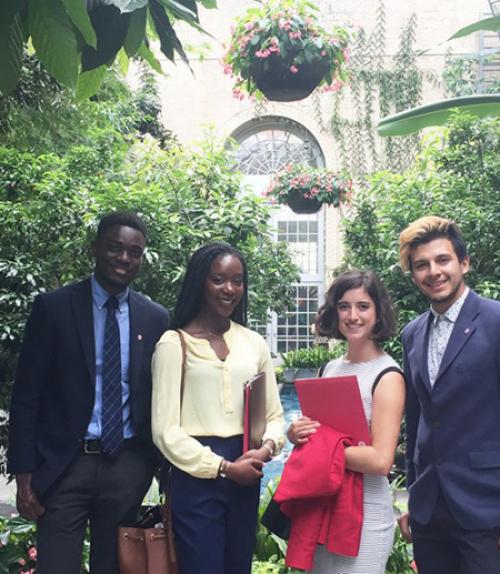Thirteen students participating in the Ronald E. McNair Post-Baccalaureate Achievement Program at Cornell traveled to Washington, D.C., June 28 to advocate for federal programs assisting first-generation and low-income college students.
The McNair Scholars Program at Cornell, administered by the Office of Academic Diversity Initiatives (OADI), is funded by the Department of Education through the Federal TRIO Program. TRIO consists of eight programs that provide support to low-income, first-generation or otherwise disadvantaged high school and college students. As one of those programs, McNair helps to prepare undergraduate students to pursue a doctorate in any field. In the first five years of the McNair Scholars Program at Cornell, 70 percent of scholars started Ph.D. programs upon graduation.
Current McNair students hailing from six states met with congressional representatives and staff members to ask for continued funding of TRIO programs. For the past two years, the Trump administration proposed eliminating McNair and making deep cuts to other TRIO initiatives. While Congress has not supported these changes, the House of Representatives’ higher education reauthorization bill, known as the Promoting Real Opportunity, Success and Prosperity through Education Reform (PROSPER) Act, also reduces funding for TRIO programs and proposes new limitations for awardees.
Kristen Adams, Cornell assistant director of federal relations, coordinated the McNair advocacy day alongside Tremayne Waller, director of the McNair Scholars Program and Student Success Programs in OADI. “The PROSPER Act still could be brought to the floor in 2019,” Adams said. “It is crucial that Congress hear the voices of the students who rely on these programs and understand the value before considering making cuts to McNair and TRIO.”
Waller said: “It’s critical for our McNair Scholars to engage in advocacy. It is one way to strengthen their participation and their voice in the process.”
The group of McNair scholars participated in 24 meetings with congressional offices over the course of the day, including those representing each student’s home district.
Mechanical engineering senior Laura Vasquez-Bolanos ’19 attended meetings with Sens. Tim Kaine and Mark Warner and Rep. Barbara Comstock.
“As a resident of northern Virginia, I’ve had the opportunity to visit Congress and the White House, but being able to advocate on Capitol Hill for the McNair Scholars Program has been very eye-opening, energizing and inspiring,” said Vasquez-Bolanos. “McNair helped me combat the imposter syndrome and obtain opportunities to confidently pursue a Ph.D. I am grateful for this day on Capitol Hill to advocate for a program that has done so much for me.”
Research is an integral part of Cornell’s McNair Scholars Program, and all rising seniors in the program are conducting summer research in their fields. Nine Cornellians have won National Science Foundation Graduate Research Fellowships since McNair began in 2012.
Edgar Barraza ’19 is a senior in physics and computer science and works with the Cornell High Energy Synchrotron Source to discover new subatomic particles using machine learning. After graduating from Cornell and receiving his doctorate, he plans to teach and conduct research as a university professor. Barraza said: “The McNair program has been instrumental to my development as a first-generation student at Cornell, and I would not have the same opportunity to do research without the program’s support. It’s my responsibility to use my privilege to advocate for McNair and ensure that others are provided the same much-needed resources to succeed.”
The last meeting of the day was with Alex Payne ’09, an education policy adviser for the House Committee on Education and the Workforce. Payne graduated from the College of Human Ecology and was an aide to the 2012 Obama campaign before serving as a higher education expert in Congress.
“McNair has bipartisan support in Congress,” Payne said. “You all have unique experiences to share with policymakers, including your experience with McNair, and coupled with your skills in science and research, you have many tools to leverage for your future.”
This story also appeared in the Cornell Chronicle.




